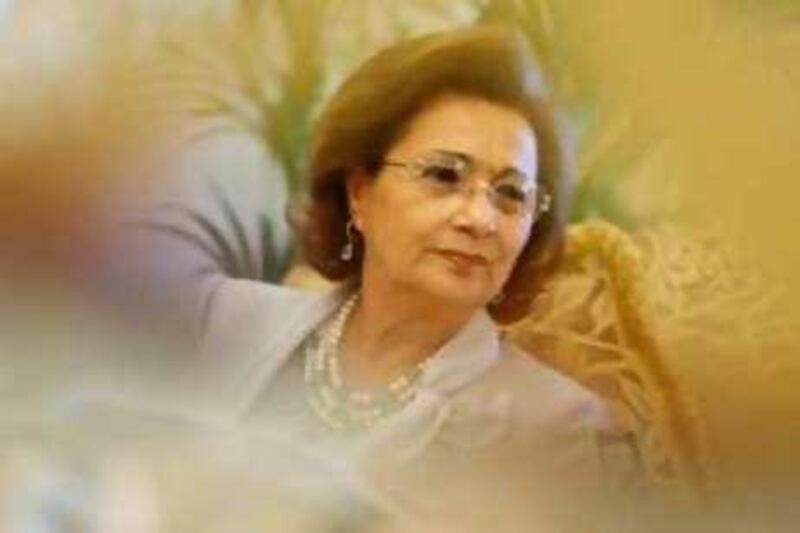ABU DHABI // Egypt's first lady, Suzanne Mubarak, said yesterday that recommendations from a high-level women's conference in Abu Dhabi dealing with human security would be forwarded to the UN's Security Council.
"This is the first time ever to assure that we will be heard, and documents that come out of this conference will be taken into consideration at the Security Council," Mrs Mubarak said yesterday in an interview at the end of the second Arab Women Organization conference. "After this conference, in an issue as critical, as delicate, as controversial as human security, the Arab women's voice is going to be heard on the international level.
""We're going to make sure that our voices are heard. The United Nations has come with the concept of human security and we're the ones who are working on it. "We're part of the international family. We cannot be isolated. They give us the chance to discuss this concept, what we accept and what we don't accept." During the three-day conference, experts discussed human security from the aspects of culture, education, health, environment, economy, social policies and armed conflicts.
Mrs Mubarak said the empowerment of Arab women was being hampered by religious trends in the Middle East that propagate a literalist interpretation of Islam, a "religious trend that wants to push us backward". "There are still some minds that think, 'She shouldn't be out, she should stay in the house, she shouldn't work'," she said. "Women have to be more educated to realise that this is not the real Islam. The real Islam does not allow that to happen. I think we need to do more."
Mrs Mubarak said there were also cultural and social attitudes that stood in the way of women's empowerment. "We still have to work very hard on the cultural aspect, on the mindset of the society," she said. "More and more education, more and more public awareness. It's not because we want women to be part of the process, but because women do have a lot to offer and they can help and they can support in making our societies much better.
"Women have their own ideas, their own perspective, have their own background and in their own right they can help move on the development agenda." The World Economic Forum's Global Gender Gap Report 2008, released this week, found that most Arab countries' overall gender gap was among the widest of 130 countries surveyed. The UAE ranked 105th. Mrs Mubarak said that political gap was the most challenging for women, because in most of the Arab countries the education gap, for example, was narrowing.
"More women should be at every decision-making level and this is a matter of changing how people perceive the role of women." She spoke of the importance of actively involving women in decision-making, rather giving them cosmetic roles. "We want them to be part of the process and I am sure they will be a good addition, especially with decisions that affect their own lives and families," Mrs Mubarak said.
"When there are women in parliament they will make sure that gender issues are discussed... We have women who can be leaders... so give them their chance." Mrs Mubarak said education should be the top priority: "If a woman is educated then she has the skills, has the access for information, she has the possibility of being part of either the labour market or to start to become part of the entrepreneurship as a businesswoman, then she becomes economically independent."
She said the education gap was closing in Egypt. But in countries such as Yemen, more than two thirds of women are illiterate. When asked about women in the UAE, Mrs Mubarak said: "They've come a long way. They've come a really fantastic way." They are "well educated, they have the chance to go to higher education, travel abroad to get their PhDs and coming back and taking on positions, and this is because the system has allowed for that", she said.
The government "invested in education, they've invested in people, they've in invested in women and today they are reaping the fruits. I congratulate them with all my heart". mhabboush@thenational.ae






